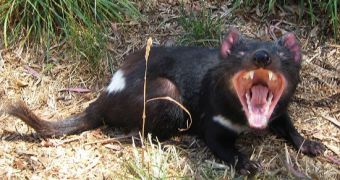Tasmanian devils are currently listed as an endangered species, and conservationists fear that, because of a contagious form of cancer that has taken its toll on their population, these animals might soon fall off the biodiversity map.
However, a team of researchers working with the Cambridge University now maintain that, after spending numerous days studying the cancer affecting these animals, they came fairly close to developing a vaccine for the so-called facial tumor disease currently killing Tasmanian devils by the hundreds.
These Cambridge University specialists explain that since the scientific community first became acquainted with this peculiar form of cancer (i.e. nearly 20 years ago) and up until present day, the overall headcount for the Tasmanian devils has dropped by a whopping 85%.
By the looks of it, this facial cancer spreads from one animal to another during fights. More precisely, a Tasmanian devil that is already suffering with this disease has high chances of infecting another one when biting into its flesh.
Interestingly enough, the Tasmanian devils' immune system does nothing to fight back this contagious cancer.
As explained by the Cambridge researchers in their study, this is because the cancer now spreading amongst these animals lacks a very specific type of molecule whose purpose is that of letting the immune system know whether or not a given cell has to be destroyed or ignored.
“These molecules enable the immune system to determine if a cell is friend or foe, triggering an immune response if the cell is foreign and a potential threat.”
“The new research, published today, 11 March, in the journal PNAS, reveals that DFTD cancer cells lack these critical molecules, thereby avoiding detection by the devils’ immune system,” reads the official website for the Cambridge University.
It is the researchers' hope that, should they succeed in forcing the cancer to start producing these molecules, the Tasmanian devils' immune system will learn to pick up on the threat and take care of business itself.
“Developing a vaccine based on our research could tip the balance in the favour of the devil and give them a fighting chance,” stated the study's lead author, Dr. Hannah Siddle.

 14 DAY TRIAL //
14 DAY TRIAL //